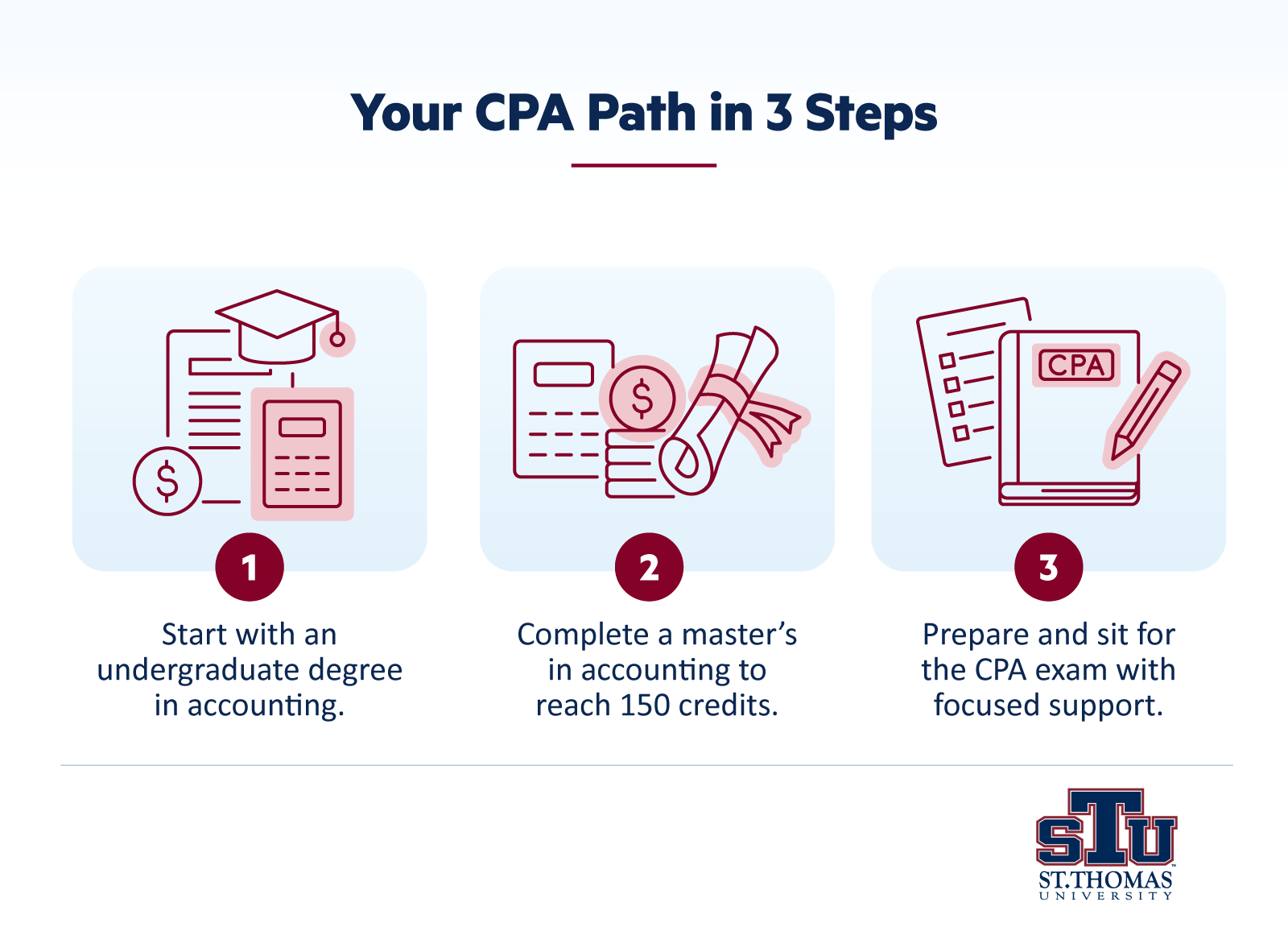
If you’re wondering: “Is a master’s in accounting worth it?” you’re not alone. With rising demand for skilled professionals and more flexible paths to certification, the value of an online master’s in accounting (MAcc) continues to grow. For working professionals, recent grads with a bachelor’s degree and those seeking a career change, a master’s degree in accounting can unlock both short-term skill gains and long-term earning potential.
A major draw is CPA exam eligibility. Many states require 150 credit hours for licensure, which a master’s program can help fulfill. Add to that the convenience of online coursework, and the appeal becomes clear.
The U.S. Bureau of Labor Statistics (BLS) projects a 6% growth in jobs for accountants and auditors between 2023 and 2033. With increasing complexity in financial regulation and reporting, demand is expected to rise for professionals with advanced coursework and credentials.
Is a Master’s in Accounting Worth It in 2025?
Yes — a master’s in accounting is worth it for many professionals aiming to take the CPA exam, pursue leadership roles or specialize in advanced accounting. The combination of technical skill-building, credentialing support and job market outcomes makes this master’s program a smart investment.
According to BLS, the median salary for accountants and auditors reached $81,680 in May 2024. Those with CPA licenses or master’s-level certifications often exceed that average, particularly in management and consulting roles. For comparison, CPA pass rates hover around 50%, making thorough preparation through a structured master’s program critical.
For students applying to St. Thomas University (STU), a key benefit is that no GMAT is required, a significant barrier removed. The school’s master’s program supports accounting professionals in achieving higher-level credentials like the CPA or CMA, both of which improve job security and salary potential.
Key Benefits of an Online Master’s in Accounting
An online master’s in accounting offers more than just convenience. It supports career advancement by equipping students with skills and credentials that unlock higher salaries, strategic roles and access to top accounting firms. The online MAcc program at STU also features an accelerated timeline, year-round start dates and no GMAT requirement.
Here are the top benefits of enrolling in an online master’s in accounting:
- CPA eligibility: An online MAcc degree helps fulfill the 150-credit requirement for licensure in most states.
- Higher salaries: Graduates often out-earn bachelor’s-only professionals; financial managers earn $161,700 annually on average.
- Leadership roles: A MAcc online program prepares students for positions such as a certified management accountant or a chief financial officer
- Flexible access: Online formats allow for learning without interrupting current job responsibilities.
- Career opportunities: This degree opens doors to advanced roles in public accounting, corporate finance and government sectors.
Tuition for online MAcc programs varies widely, with some programs costing more than three times as much as most online options. STU offers a competitive balance between cost and value.
CPA Certification and the 150-Credit Rule, Explained
To become a certified public accountant, candidates must meet education, experience and exam requirements, the most misunderstood of which is the 150-credit hour rule. While an undergraduate degree in accounting typically covers about 120 credits, most states require an additional 30 to qualify for the CPA exam.
A MAcc is one of the most straightforward ways to meet this requirement. It not only bridges the credit gap but also builds the technical knowledge needed to pass the exam and thrive in the accounting field. Whether you’re pursuing full-time or part-time study, the additional coursework reinforces critical skills in ethics, auditing and taxation, all of which are essential for today’s job market.
STU’s program is purpose-built to meet CPA requirements and is especially flexible for working professionals. Its online structure supports learners from nonprofit organizations, corporate finance and public practice, providing career mobility without disrupting current employment.

Career Paths With a Master’s in Accounting
A master’s degree equips accounting graduates for roles that go far beyond entry-level positions. With deeper expertise in accounting principles, data analysis and leadership, this advanced degree opens doors across every area of accounting — from corporate finance to forensic accounting.
Here are some of the top career paths available to MAcc graduates, along with their earning potential:
- Chief financial officer: Oversees organizational finance strategy, planning and compliance (median pay: $313,000)
- Financial analyst: Provides insights on investments, performance metrics and business forecasts (median salary: $101,910)
- Forensic accountant: Investigates fraud and supports legal cases with in-depth financial analysis (average salary: $85,177)
- Internal auditor: Evaluates internal controls and operational efficiency for risk mitigation (median pay: $107K)
- Tax manager: Directs corporate or individual tax planning, compliance and filing (average salary: $129,367)
- Accounting manager: Leads teams that manage reporting, general ledger and financial closing processes (average salary: $95,659)
These leadership-oriented positions require not just technical training but also strong critical thinking and decision-making. STU’s MAcc program is designed with those career goals in mind, helping graduates stand out in today’s competitive accounting career landscape.
MAcc vs. MBA: Which Advanced Degree Is Right for You?
If you’re weighing your options beyond a bachelor’s degree, choosing between a Master of Accounting (MAcc) and a Master of Business Administration (MBA) could significantly impact your future in the financial world. Both degree programs offer compelling advantages, but depending on your career goals, one may serve you better than the other.
For aspiring CPAs or those pursuing careers in financial reporting, auditing or tax, a MAcc is a more focused accounting program. It delivers the deep, technical expertise needed to pass the CPA exam and excel in public or corporate accounting.
Accounting professionals with more focused and extensive experience earn an average annual salary of $61,717, compared to the overall average of $53,604, according to Indeed. In addition, accounting managers with a high level of experience and credentials, such as a master’s in accounting, can earn $86,113 annually.
In contrast, the MBA provides a broader business education, ideal for those aiming for leadership roles across multiple disciplines, from marketing to management.
A side-by-side comparison can help clarify how each degree aligns with your goals:
| Feature | MAcc (master of accounting) | MBA (master of business administration) |
| Primary focus | Technical accounting, auditing, financial reporting, tax, GAAP, IFRS | Broad business acumen — management, strategy, marketing, operations |
| Ideal for | Aspiring CPAs, auditors, controllers, accounting consultants | Professionals targeting executive, general management or entrepreneurship roles |
| Program type | Specialized degree program focused on accounting and finance | Generalist degree program with optional concentrations (e.g., accounting, finance) |
| CPA exam prep | Strong emphasis — meets 150-hour requirement in many states | Varies by program; only accounting concentrations provide CPA exam prep |
| Career entry | Entry-level to mid-level accounting roles; CPA track | Entry-level business analyst to mid-level management; less CPA-focused |
| Key skills gained | Financial analysis, financial reporting, auditing, data analytics, ethics | Strategic thinking, leadership, project management, marketing |
| Format options | Often available full-time, part-time or hybrid; evening classes common | Available full-time, executive, online or part-time |
| Typical duration | 12-18 months | 18-24 months |
Explore the 100% online MBA program at STU. Advance your career with an affordable, fully online MBA that can be completed in as few as 12 months. No GMAT is required, and its flexible start dates fit your schedule.
Online vs. On-campus MAcc
Choosing between an online or on-campus master of accounting program depends on your schedule, learning preference and career priorities. STU offers both formats: a fully online MAcc built for working professionals and a campus-based MAcc with flexible evening and hybrid options.
Here’s a quick comparison to help you decide which format best fits your goals:
| Feature | Online MAcc | On-campus MAcc |
| Format | 100% online | Evening, on-campus, or hybrid |
| Duration | As few as 12 months | Typically 12-18 months |
| Flexibility | Designed for working professionals | Evening courses; hybrid scheduling |
| Start dates | Six start terms per year | Six start terms per year |
| GMAT/GRE requirements | No GMAT required | No GMAT or GRE required |
| CPA preparation | Meets 150-credit requirement; CPA-aligned curriculum | CPA-aligned curriculum with exam-focused coursework |
| Learning experience | Asynchronous with optional live sessions, faculty support | In-person instruction with access to campus resources |
| Networking opportunities | Virtual engagement with faculty and peers | In-person networking and professional events |
Both formats share the same rigorous coursework and are taught by experienced faculty who integrate real-world accounting knowledge into every course. Whether you prioritize flexibility or face-to-face connection, STU’s MAcc program is designed to deliver career-ready outcomes.
How To Choose the Right Online Accounting Program
It’s no surprise that 72% of MAcc programs reported increased applications in 2024; demand is growing for specialized programs that deliver tangible results. However, not all accounting programs offer the same level of rigor, flexibility or career preparation.
When evaluating your options, look for programs that build strong accounting knowledge while aligning with your personal and professional goals. Here are the key factors to consider:
- Accreditation and reputation: Choose a graduate degree program from an accredited institution with a proven track record in the accounting field.
- CPA exam preparation: Ensure the program includes enough credit hours and coursework to meet the 150-hour CPA requirement and offers targeted CPA exam
- Faculty expertise: Look for experienced instructors who combine academic credentials with real-world accounting and information systems
- Curriculum relevance: Select a program with updated, practical content in areas like forensic accounting, tax planning and internal auditor
- Career support: Use career services — including resume coaching, networking access and job placement guidance — to help secure leadership positions after graduation.
STU’s Master of Accounting online program checks all of these boxes, with no GMAT requirement, flexible scheduling and a curriculum aligned with the CPA exam and today’s market needs.
Should You Get a Master’s in Accounting?
The short answer is yes — if it enhances your real-world skills and CPA eligibility. The right program strengthens your foundation in risk management, accounting principles and specialization areas such as tax or auditing, all while boosting your earning potential.
An online master’s in accounting also provides flexibility for professionals balancing work and study. It qualifies you for senior roles in the accounting profession, such as controller, auditor or financial analyst, and prepares you to manage increasingly complex financial challenges in today’s business environment.
The return on investment becomes clear when you consider the long-term career benefits. Whether your goal is to earn a promotion, transition into leadership or qualify for CPA licensure, an MSA gives you the tools to get there. For those pursuing specialized roles or advanced credentials, it’s a strategic move that pays off.
Explore STU’s online Master of Accounting program to see how it can support your goals. Request more info or apply today.

FAQ Section
Thinking about earning an online MAcc? Here are answers to common questions:
Is an online MAcc degree respected by employers?
Yes — as long as the program is accredited and prepares students for the CPA exam, employers recognize online MAcc degrees as equal to on-campus versions. STU’s online accounting program, for instance, mirrors its campus counterpart in quality and rigor.
How long does it take to earn a master’s in accounting online?
Most online accounting programs take 12 to 24 months to complete. STU’s online program can be finished in as few as 12 months, making it ideal for working professionals seeking efficiency without compromising depth.
What’s the average salary bump with a master’s in accounting?
While salaries vary, master’s graduates consistently earn more than those with only a bachelor’s degree. According to Indeed, accounting professionals earn an average annual salary of $53,604, but those with more extensive experience and education, such as a master’s in accounting, earn $86,113 annually.
Is a master’s or CPA better for accounting careers?
It depends on your career path. A CPA credential is critical for public accounting roles, while a master’s opens doors to leadership, specialization and advancement within corporate, nonprofit or government sectors. The best path often includes both, and the right accounting program helps you pursue each credential efficiently.